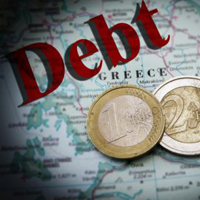Greece is facing a banking collapse and a humanitarian crisis, unless it comes up with credible reforms and accepts the terms of a debt bailout by the IMF and European Central Bank. Or so the narrative of the dominant economic and political powers goes. The problem is that the world itself is already in crisis due to global economics, destructive debt-based money systems, and a lack of community-centred currencies. Yet, because the Greek situation is an extreme manifestation of our global crisis with its people clearly suffering, selective thinking misses this point, focuses on the practices of the Greek Government, and ignores the fact that the Greek Debt Crisis is but a symptom of what goes wrong when we lose the power of authentic, community-driven economics that serves people rather than economic powers. In this post I am going to explain from a bigger perspective of authentic living why the Greek Debt Crisis has occurred, and what the real solutions are.
The Greek Debt Crisis
On 5 July 2015 Greece voted in a referendum to reject the latest proposed austerity measures from the International Monetary Fund, European Central Bank, and European Commission, which include further cuts to social spending. This occurred after Greece missed a 1.6 billion euro payment to the IMF at the end of June, the first European Union country to fail on a loan repayment to the IMF. It also came at a time when Greek banks have been forced to close after a stop in emergency funding from the European Central Bank. The country’s banks now are now at risk of collapse, and the country could be forced to leave the euro, which in turn may destabilise the whole Eurozone.
The crisis in Greece was bound to occur, as a constellation of factors lay brewing together. Such factors, which are widely known include:
- Increasing trade deficit (greater imports than exports) following the adoption of the euro common currency.
- The global recession of 2007-2009 that impacted Greece’s main industries of tourism and shipping.
- Collapsing economic output (GDP).
- Mass unemployment (now 25%).
- Greece’s misrepresentation of its government debt statistics.
- Tax evasion and corruption in tax offices.
- Greece’s inability to devalue its currency due to adoption of the euro, prompting a reduction in wages.
- Loss of credit rating and international confidence, resulting in withdrawal of private foreign capital and the need for EU and IMF bailout loans.
- Imposition of crushing austerity measures by the IMF and European Central Bank.
- Delayed implementation of the agreed conditions in the bailout programme.
- A new government refusing to respect the terms of its current bailout agreement.
It can be seen from the above that the causes of the Greek Debt Crisis are in fact a result not only of Greek economic and political practices but also of being part of an oversized economic system that includes the Eurozone and the global economy.
Lessons of the Greek Crisis
The lessons of Greece show the following:
- Globalisation and large-scale currencies take economic control away from local people.
- Failure to use local currencies not only renders people helpless to control their economic destiny, but also keeps people’s potential untapped at times of mass unemployment.
- In oversized economies and societies, without community accountability and decision-making, management of economic affairs is fraught with difficulty and ripe for deception and corruption.
- Participating in debt-based money systems drains local money and energy into big banks and financial powers.
- Imposing austerity measures for the benefit of maintaining a transnational economic structure creates severe economic and social effects in a country.
- A lack of local authentic community means that people have to resort to protests when the economic practices of Government fail, rather than create economic alternatives themselves.
- Spending beyond our means is encouraged in a debt-based money system, but has destructive consequences.
It is important to understand that countries with different economic circumstances and needs will always fare differently when they share a single monetary policy, and thus will be challenged even further to meet their individual needs. Furthermore, regions and communities within an individual country will themselves have different neeeds that require different economic responses, and ideally different economies and money systems tied to their local communities. Trying to impose one homogenised economic policy from a global, continental, or even a national level is standard practice in big centralised economics, but is never a solution for recognising and meeting the individual local needs of people, and at best is a bodge that results in unmet economic needs and inequalities of economic wellbeing.
The Solution to the Greek Debt Crisis and World Economic Crisis
Solving a crisis from the same perspective that created it will never work. In order to find a solution to the economic crises of our times, we need to start thinking outside the box of big economics and recall that true economics is really about meeting our needs as people and communities before anything else. In order to solve an economic crisis we must address the real purpose of living itself, and not get lost in traditional economic theory and the demands of big economic powers.
As individuals we have certain needs to meet, and so form connections with others to cooperate in meeting these needs. To reduce our reliance on bartering, a currency is created as a medium for exchanging the products and services that we need. This is the true purpose of economics, to which—if we are wise—we should always keep to.
The challenge to keeping to the true purpose of economics—meeting our individual needs with the help of others—occurs when we lose our responsive network of support. This responsive network of support can only exist as a local, authentic community that is of an optimal size to be sufficiently close-knit and to foster accountable, compassionate behaviour for the good of all within that community. In today’s age, these kind of local economies no longer exist except on the fringe as intentional communities, or as conscious community groups that use local currencies.
Let us begin solving the economic crisis that we find ourselves in, whether we are in Greece or elsewhere, by starting with the basics again. Let us stay mindful and remember what economics is about. It is certainly not about perpetuating debt which inevitably occurs in a debt-based money system. True economics is primarily a community experience, because only within a strong, close-knit, and authentic community can the relationships of support be formed to create an authentic local economy that meets our needs.
The community experience of economics requires a local community currency tied to that community to ensure that the local community economy is not drained or ripped apart. Of course, there will always be a place for regional, national, and international economics alongside community economics, as communities connect with each other across regions, nations, and the world in networks of support, but the community itself and its local economy should never be broken down in the process. To this end, community currencies can co-exist with regional, national, and global currencies, each separate level of currency protecting each economy.
In summary, the three primary steps to creating healthy and sustainable economies, and ending the world crisis of debt are:
- Create authentic local communities as the primary focus for economic support.
- Use a local currency to keep the local community and its economy intact, and use complementary currencies for mutual support between communities, regions, and nations.
- Use a debt-free money system at all levels of economic interaction.
To read more about authentic community-building, read my posts Why We all Need Authentic Community and How You Can Start an Authentic Community
To read more about the benefits of local currencies, read my post 8 Good Reasons to Use a Local Complementary Currency
To read more about the need for a debt-free money system, read my post Debt-Free Money v Money-as-Debt
Like this article? Spread the word by sharing the link.








This is an excellent and easy to understand article giving an over arching perspective of the Greek debt crisis. Not only that but viable, inclusive and mindful solutions are offered. I really wanted to post it on my fb page bit the link doesn’t go directly to the article but to the whole website. Thank you Leigh for explaining a way forward so clearly